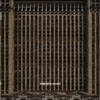Ann Arbor’s D’Marc Cantu has seen a significant rise in profile over the last couple years, largely off the strength of singles like “Set Free” — one of LWE’s top tracks of 2011 — and Fallen, his exceptional debut LP for Crème Organization. The latter only arrived at the tail end of last year, so the appearance of another album so soon after, this time a joint release between Aroy Dee’s M>O>S and its parent label Delsin, may raise some eyebrows.
Granted, the eight-track A New World isn’t quite as expansive as its predecessor, which, apart from being three tracks longer, had the expected breadth and intensity of a first album. In addition, Cantu is — along with associates James T. Cotton and Traxx — an avowed practitioner of “Jakbeat,” which lends a certain degree of timelessness to his sound. Jakbeat is a pseudo-genre invented by the artists themselves (and is surely not a total guarantee of quality), but its principles (“resisting the current trend for an over-calculated digital sound”) go a long way in explaining how Cantu so reliably twists the endlessly copied Detroit techno and Chicago house into fresh forms.
At this point, claiming something is a fresh variation on Detroit or Chicago is about as hackneyed as biting those cities’ sounds in the first place. And several of these tracks do contain classicist references, whether via acid or even more overt elements. For example, “The First Planet” is almost definitely a tribute to Larry Heard — both in its title (a probable reference to Fingers Inc.’s influential “Distant Planet”) and in the undulating Juno-6-esque line that runs throughout. Its avoidance of retroist traps owes in part to the record’s smart sequencing. “The First Planet” follows up the shockwave arpeggios of “Mobile Communication,” and its relaxed throwback is a welcome chaser to that track’s high-octane attack. Besides this, the loose-but-muscular Jakbeat ideal remains a serious draw. The perpetually off-balance “Try Me” morphs into an array of radically shuffled jack moves, while conversely the rigid slink of “The Other Side Of House” reminds of Tomas’ eerie Warp one-off “Mind Song.” But it is opening track, “Good,” that steals the show. One of Cantu’s finest pieces yet, “Good” is a mirage of slow, hazed-out 2-step, and its rhythm spends the duration rippling through calmative synth fumes. Its presence as a confounding introduction is a solid indicator of what A New World is all about — an unpredictable show of character from a very crafty producer.















